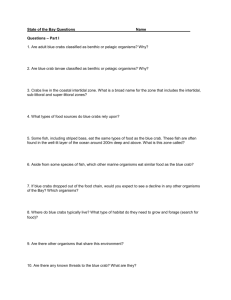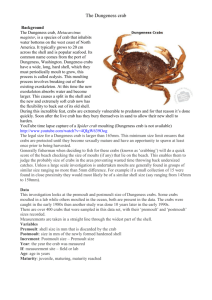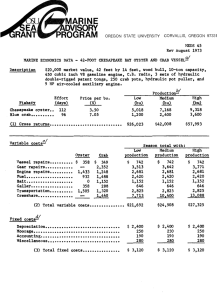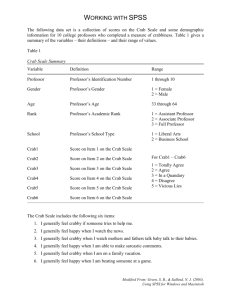Oregon Bay Crab Identification Guide
advertisement
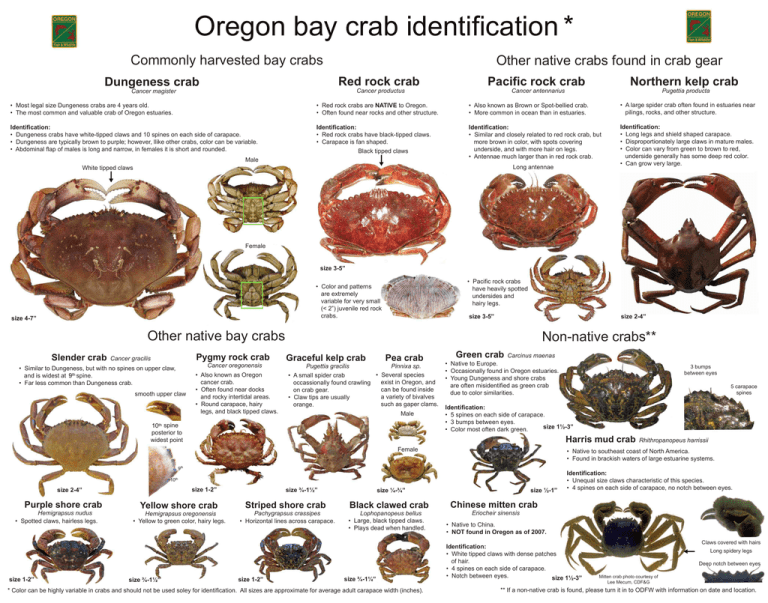
Oregon bay crab identification * Commonly harvested bay crabs Other native crabs found in crab gear Red rock crab Dungeness crab Pacific rock crab Cancer productus Cancer magister Northern kelp crab Cancer antennarius Pugettia producta • Most legal size Dungeness crabs are 4 years old. • The most common and valuable crab of Oregon estuaries. • Red rock crabs are NATIVE to Oregon. • Often found near rocks and other structure. • Also known as Brown or Spot-bellied crab. • More common in ocean than in estuaries. • A large spider crab often found in estuaries near pilings, rocks, and other structure. Identification: • Dungeness crabs have white-tipped claws and 10 spines on each side of carapace. • Dungeness are typically brown to purple; however, llike other crabs, color can be variable. • Abdominal flap of males is long and narrow, in females it is short and rounded. Identification: • Red rock crabs have black-tipped claws. • Carapace is fan shaped. Identification: • Similar and closely related to red rock crab, but more brown in color, with spots covering underside, and with more hair on legs. • Antennae much larger than in red rock crab. Identification: • Long legs and shield shaped carapace. • Disproportionately large claws in mature males. • Color can vary from green to brown to red, underside generally has some deep red color. • Can grow very large. Black tipped claws Male Long antennae White tipped claws / 4' b Female -I- size 3-5” frd -U' • Color and patterns are extremely variable for very small (< 2”) juvenile red rock crabs. size 4-7” • Pacific rock crabs have heavily spotted undersides and hairy legs. t-size 2-4” size 3-5” Other native bay crabs Slender crab Pygmy rock crab Cancer gracilis Cancer oregonensis • Similar to Dungeness, but with no spines on upper claw, and is widest at 9th spine. • Far less common than Dungeness crab. smooth upper claw • Also known as Oregon cancer crab. • Often found near docks and rocky intertidal areas. • Round carapace, hairy legs, and black tipped claws. Non-native crabs** Graceful kelp crab Pea crab Pinnixa sp. • Several species • A small spider crab exist in Oregon, and occassionally found crawling can be found inside on crab gear. a variety of bivalves • Claw tips are usually such as gaper clams. orange. Pugettia gracilis Male w 10th spine posterior to widest point Green crab Carcinus maenas • Native to Europe. • Occasionally found in Oregon estuaries. • Young Dungeness and shore crabs are often misidentified as green crab due to color similarities. Purple shore crab Hemigrapsus nudus • Spotted claws, hairless legs. Yellow shore crab Hemigrapsus oregonensis • Yellow to green color, hairy legs. size ¾-1½” Striped shore crab Pachygrapsus crassipes • Horizontal lines across carapace. Lophopanopeus bellus • Large, black tipped claws. • Plays dead when handled. .i.. -f -*.; 1. (_______ size 1-2” size ¾-1½” size 1-2” size ½-1” size ¼-¾” Black clawed crab size ¾-1¼” * Color can be highly variable in crabs and should not be used soley for identification. All sizes are approximate for average adult carapace width (inches). - Rhithropanopeus harrissii • Native to southeast coast of North America. • Found in brackish waters of large estuarine systems. 10th size 1-2” -s- 0 Harris mud crab 9th size 2-4” 5 carapace spines .').: Identification: • 5 spines on each side of carapace. • 3 bumps between eyes. size 1½-3” • Color most often dark green. Female I 3 bumps between eyes Identification: • Unequal size claws characteristic of this species. • 4 spines on each side of carapace, no notch between eyes. Chinese mitten crab Eriocheir sinensis • Native to China. • NOT found in Oregon as of 2007. Identification: • White tipped claws with dense patches of hair. • 4 spines on each side of carapace. • Notch between eyes. size 1½-3” 'A Claws covered with hairs Long spidery legs Deep notch between eyes Mitten crab photo courtesy of Lee Mecum, CDF&G ** If a non-native crab is found, please turn it in to ODFW with information on date and location.
